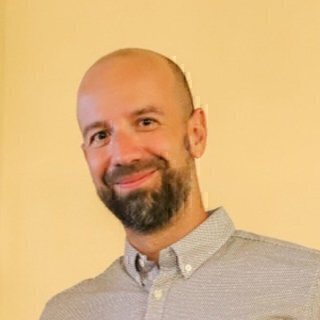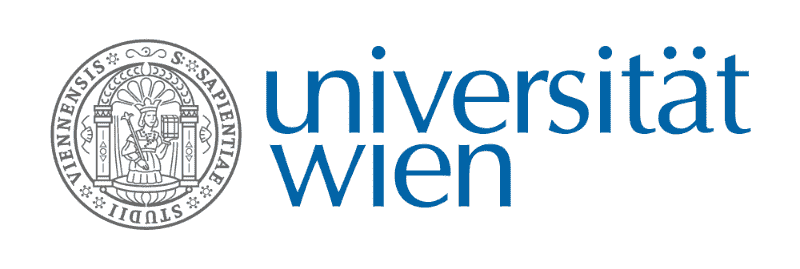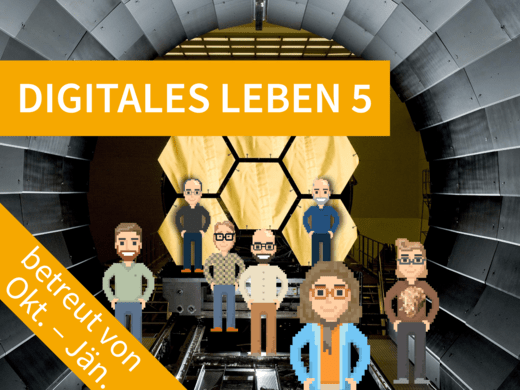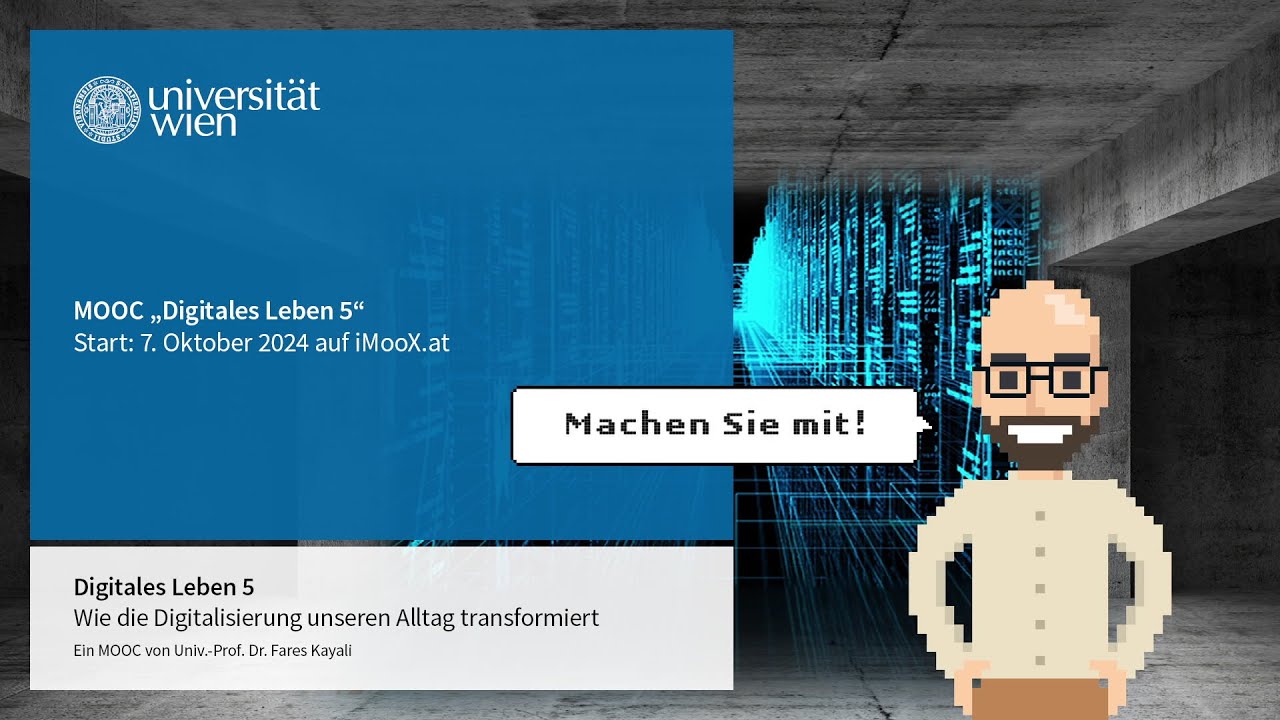Digitales Leben 5
Kursstart: 7. Oktober 2024
Digitales Leben 5
Univ.-Prof. Dr. Fares Kayali
Dieser Kurs ist Teil einer MOOC-Serie: Digitales Leben – wie die Digitalisierung unseren Alltag transformiert
Dieser Kurs ist Teil einer MOOC-Serie: KI-MOOCs
Wissenschaftliche Einordnung:
Kursstart: 7. Oktober 2024
Digitales Leben 5
Univ.-Prof. Dr. Fares Kayali
Dieser Kurs ist Teil einer MOOC-Serie: Digitales Leben – wie die Digitalisierung unseren Alltag transformiert
Dieser Kurs ist Teil einer MOOC-Serie: KI-MOOCs
-
Umfang: 5 Lektionen
-
Aufwand: 4 Stunden/Woche
-
Teilnehmende aktuell: 497
-
Lizenz: CC BY-SA 4.0
-
Kursstart: 7. Oktober 2024
-
Kursende: -
-
Status aktuell: Laufender Kurs
-
Verfügbare Sprachen:
Trailer
Details zum Kurs
Inhaltsübersicht
Kursinhalt
Immer mehr Menschen sind digital vernetzt und interagieren auf diesem Weg miteinander. Sie interagieren aber auch direkt mit der digitalen Technologie selbst. Wie kann das auf ethische, kreative und zukunftsorientierte Weise gelingen? Wie prägen digitale Technologien zukünftig und bereits heute Arbeitsleben, Sozialkontakte und Bildungsangebote? Der MOOC „Digitales Leben 5“ beschäftigt sich in insgesamt 20 Lernvideos mit Zukunftsvisionen, Wissensmanagement und Interaktionen im Kontext der Digitalität. In 5 Lektionen diskutieren 5 Vortragende aus technischer, philosophischer, künstlerischer und aktivistischer Sicht die Grundvoraussetzungen für digitalen Wandel, mögliche Effekte und anschauliche Praxisbeispiele.
Die Themen der 5 Lektionen sind:
- Geschichte, Veränderung und Erweiterung von Digitaler Bildung
- Körper, Krieg, Computer und andere zeitlose ethische Fragen
- Herausforderungen in der Interaktion zwischen Menschen und Robotern
- Kunst und Technologie als Werkzeuge der Gesellschaft
- Zukunftsperspektiven für Jugend und Online-Miteinander im KI-Zeitalter
„Digitales Leben 5“ bildet gemeinsam mit „Digitales Leben 4“, „Digitales Leben 3“, „Digitales Leben 2“ und „Digitales Leben 1“ eine MOOC-Serie zu verschiedenen relevanten Aspekten der Digitalisierung und den damit einhergehenden Transformationsprozessen. Die Zahlen im Titel sollen dabei keine Reihenfolge vorgeben – als Lernende:r können Sie jeden der „Digitales Leben“-MOOCs als ersten bearbeiten.
Lernziele
Nach Absolvierung dieses MOOC kennen Sie zentrale Begrifflichkeiten, die im Zusammenhang mit Digitalisierung, dem Einsatz von Technologien und Entwicklungsmöglichkeiten für die Zukunft stehen. Entlang der ausgewählten Schwerpunktsetzungen der Vortragenden erarbeiten Sie sich ihre eigenen Standpunkte. Die Vorträge befähigen Sie, Risiken und Potenziale digitaler Transformationsprozesse zu beurteilen, konstruktiv-kritisch Position zum digitalen Wandel zu beziehen, sowie sich als aktiven Teil der digitalen Transformation zu begreifen.
Vorkenntnisse
Wir begrüßen bei den Teilnehmenden Eigeninitiative sowie selbstständiges und interessengeleitetes Erarbeiten von Wissen. Englischkenntnisse sind für einige der schriftlichen Quellen nötig (deren Lektüre allerdings optional ist).
Kursablauf
Der MOOC besteht aus einer Einführung und 5 inhaltlichen Lektionen mit jeweils 4 Lernvideos. Sobald Sie aktive:r Teilnehmer:in des MOOC sind, stehen Ihnen alle Lektionen zur Verfügung und Sie können diese in jeder selbst gewählten Reihenfolge bearbeiten. Die Videos enthalten Reflexionsfragen sowie -aufforderungen als interaktive Elemente und werden von begleitenden Informationen gerahmt. Um diskursiv eigene Standpunkte zu entwickeln, sollen Sie das Forum nutzen – wir leiten Sie dabei mit Diskussionsaufforderungen zu den einzelnen Lektionen an. Zur Selbstüberprüfung (und für das iMooX-Zertifikat) gibt es ein Quiz mit fünf Wissensfragen pro Lektion.
Titel und Vortragende der einzelnen Lektionen
- Einführung: Überblick und Erklärungen (Lektion 1)
Univ.-Prof. Dr. Fares Kayali - E-Learning, Technology Enhanced Learning, Digitale Lehre (Lektion 2)
Priv.-Doz. Dr. Martin Ebner - Künstliche Intelligenz und Gesellschaft – hat Zukunft Ethik? (Lektion 3)
Dr. Michael Funk, MA - Zukunft der Interaktion: Mensch-Roboter-Beziehungen in der Digitalen Welt (Lektion 4)
Ass.-Prof.in Dr.in Astrid Weiss - Digitale Kultur – kann Technologie die Welt verbessern? (Lektion 5)
Gerfried Stocker - Jugend, Aktivismus, Vernetzung: Digitale Bildung im KI-Zeitalter (Lektion 6)
Matthias Jax, MA
Zertifikat
Lizenz
Dieses Werk ist lizenziert unter Creative Commons - gleiche Weitergabe 4.0 International (CC BY-SA 4.0)
Zusätzliche Inhalte
Kursübersicht
- Lektion 1: Einführung
- Einführung Digitales Leben 5
- Spielerisches Element: Significant Terms
- Begriffspuzzle
- Lektion 2: E-Learning, Technology Enhanced Learning, Digitale Lehre
- Die Geschichte des E-Learning
- Die digitale Transformation der Lehre
- Die Rolle der offenen Bildungsressourcen
- o Digitale Lehre ohne Grenzen
- Lektion 3: Künstliche Intelligenz und Gesellschaft – hat Zukunft Ethik?
- Künstliche Intelligenz – Ethik oder Panda-Diplomatie?
- Leib und Körper – neue Räume für neue Elefanten?
- Krieg und technologischer Fortschritt – neue Wölfe in alten Pelzen?
- Zukunft – sei (k)ein Papagei!
- Lektion 4: Zukunft der Interaktion: Mensch-Roboter-Beziehungen in der Digitalen Welt
- Über Verkörperung und Materialität
- Über Anthropomorphisierung und Soziomorphisierung
- Wo Mensch-Roboter-Interaktion zum Einsatz kommt
- Verantwortungsvolle Innovation: Gestaltung der Zukunft mit Robotik
- Lektion 5: Digitale Kultur – kann Technologie die Welt verbessern?
- Technologie und Kultur
- Von Automatisation zu Autonomisation
- Art Thinking
- Digitaler Humanismus
- Lektion 6: Jugend, Aktivismus, Vernetzung: Digitale Bildung im KI-Zeitalter
- Künstliche Intelligenz im Alltag
- Digitale Zukunft
- Die Zukunft des Online-Miteinanders
- Wissensvermittlung
- Abschluss
Copyright
Das Kursbild des MOOC „Digitales Leben 5“ wurde vom CTL Universität Wien erstellt und ist lizenziert unter CC BY-SA 4.0 (https://creativecommons.org/licenses/by-sa/4.0/legalcode).
Verwendet das folgende Werk: Originaltitel: Architecture technology cosmos. Beschreibung: Mit Metallplatten ausgekleideter Tunnel, an dessen Ende der Spiegel eines Weltraumteleskops in Form von sechs goldenen, wabenförmig angeordneten Sechsecken sichtbar ist. Urheber:in: unbekannt. Lizenz: CC0 1.0 (https://creativecommons.org/publicdomain/zero/1.0/legalcode). Ursprungsort: https://pxhere.com/de/photo/923246. Vorgenommene Änderungen: Zuschnitt, Retusche, Einfügung von Textelement und Avatar-Grafiken.
Der Trailer des MOOC „Digitales Leben 5“ wurde vom CTL Universität Wien erstellt und ist lizenziert unter CC BY-SA 4.0 (https://creativecommons.org/licenses/by-sa/4.0/legalcode).
Hinweis: Die Quellenangaben sind beizubehalten, wenn das lizenzierte Material ganz oder in Teilen vervielfältigt und/oder weitergegeben wird oder abgewandeltes Material erstellt, vervielfältigt und/oder weitergegeben wird.
Kursleitung

Univ.-Prof. Dr. Fares Kayali
Prof. Kayali verfügt über langjährige Erfahrung im interdisziplinären Spannungsfeld von Informatik, Gesellschaft und Didaktik. Am Lehrstuhl für Digitalisierung im Bildungsbereich des Zentrums für Lehrer:innenbildung der Universität Wien betreibt er unter anderem das Computational Empowerment Lab. Er beschäftigt sich beispielsweise mit nutzer:innen-zentriertem Design, kritischen Aspekten des digitalen Wandels sowie Digital und Serious Games. Die MOOC-Serie „Digitales Leben“ ist Teil seiner Lehre im Rahmen der Vorlesung „Digitale Transformationen“ an der Universität Wien.
Vortragende
Priv.-Doz. Dr. Martin EbnerLehr- und Lerntechnologien
TU Graz
Dr. Michael Funk, MA
Cooperative Systems
Universität Wien
Matthias Jax, MA
Initiative Saferinternet.at
Österreichisches Institut für angewandte Telekommunikation (Wien)
Gerfried Stocker
Künstlerischer Leiter
Ars Electronica (Linz)
Ass.-Prof.in Dr.in Astrid Weiss
Human-Computer Interaction Group
TU Wien
Partner:innen
-

Universität Wien

